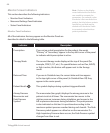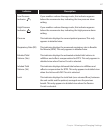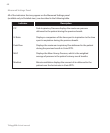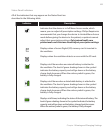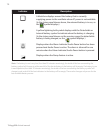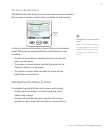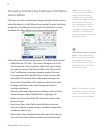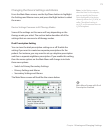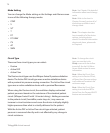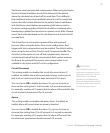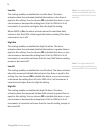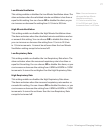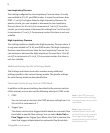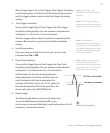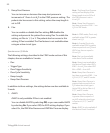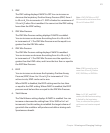Trilogy200 clinical manual
74
Note: See Chapter 3 for detailed
information about each therapy
mode.
Note: Refer to the chart in
Chapter 3 to easily review all of
the settings available in each
therapy mode.
Note: This chapter describes
how to enable all of the device
settings, including device
alarms. For detailed information
about each alarm, please refer
to Chapter 6.
Note: To change the circuit
type, you must be in the
Setup screen with the airow
turned o. See the Full Menu
Access Mode section for more
information.
Note: When the Circuit Type
setting is set to Passive Circuit,
all Ramp Start Pressure settings
in all modes will maintain the
minimum range.
Note: When the Circuit Type
setting is set to Active PAP or
Active Flow, the Flex and AVAPS
features are unavailable.
Mode Setting
You can change the Mode setting on the Settings and Alarms screen
to one of the following therapy modes:
• CPAP
• S
• S/T
• T
• PC
• PC-SIMV
• CV
• AC
• SIMV
Circuit Type
There are three circuit types you can select:
• Passive
• Active PAP
• Active Flow
The Passive circuit type uses the Whisper Swivel II passive exhalation
device. The Active PAP circuit type uses an active exhalation device
with a proximal air pressure sensing connection. The Active Flow circuit
type uses an active exhalation device with a proximal ow sensor.
When using the Passive circuit, the ventilator displays estimated
patient pressures based on the resistance of the standard patient
circuit (Whisper Swivel II with 1.8 meter tubing). Adding accessories
to the patient circuit (humidier, water trap, etc.) may cause an
increase in circuit resistance and cause the device to display slightly
higher pressures than what is actually delivered to the patient.
With the Active PAP or Active Flow circuit type selected, patient
pressure is measured directly and is not aected by any change in
circuit resistance.



